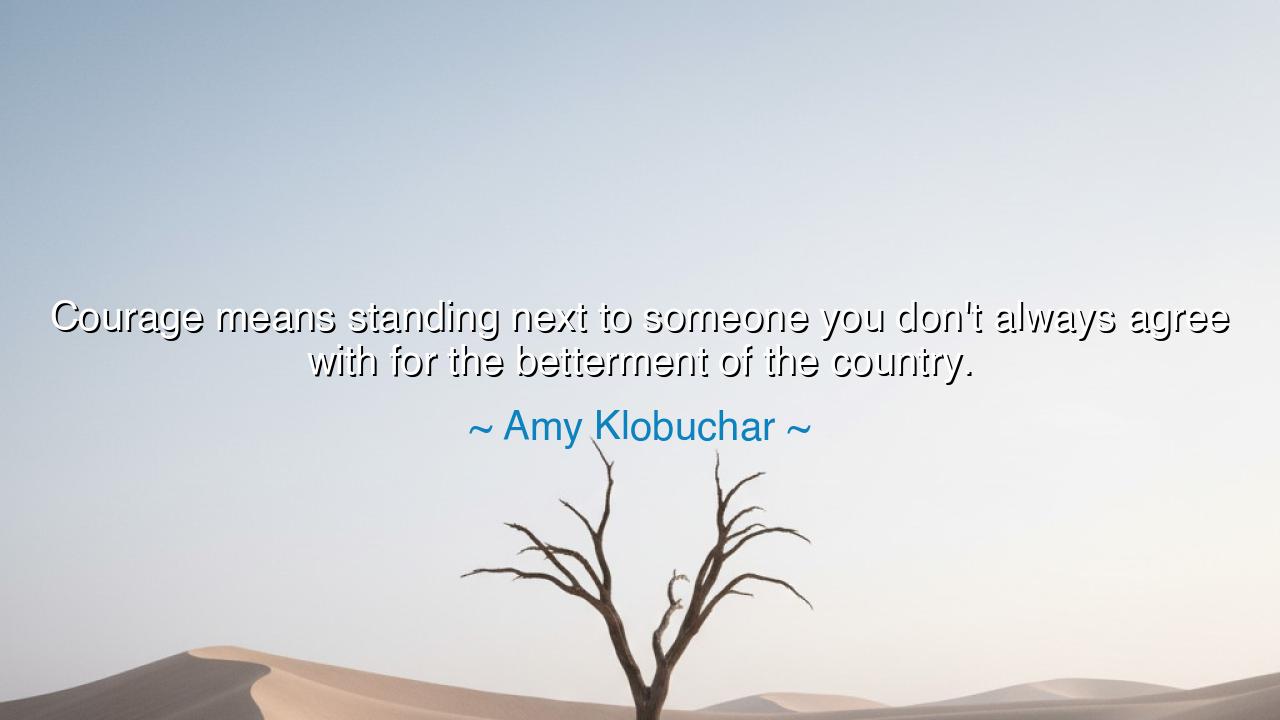
Courage means standing next to someone you don't always agree
Courage means standing next to someone you don't always agree with for the betterment of the country.






In the words of Amy Klobuchar, a voice of reason in a divided age, there lies a wisdom both ancient and enduring: “Courage means standing next to someone you don't always agree with for the betterment of the country.” Though born from the soil of modern politics, this truth reaches far beyond the halls of government. It speaks to the heart of what it means to be human — to stand together, not because we are the same, but because the destiny of the world depends upon our unity in purpose. For true courage is not merely facing danger; it is facing difference — and choosing compassion over pride, cooperation over conflict.
The origin of this quote lies in the enduring struggle of democracy itself. From the earliest days of the polis, when citizens gathered under the open sky of Athens to debate the future of their city, it was understood that the health of a nation rests not on the victory of one side, but on the strength of its people to disagree honorably. Klobuchar’s words revive this ancient truth in a time when division has become the new weapon of weakness. She reminds us that courage is not conformity, but the bravery to link arms with those whose thoughts differ from ours, so that something greater — the common good — might be preserved.
To stand beside one you do not agree with requires a strength of spirit far greater than the act of opposing an enemy. It demands humility, empathy, and the wisdom to see that no one holds the whole truth alone. This is the courage of the peacemaker, the statesman, the neighbor, the friend — the courage to say, “We may differ, yet I will not let our difference destroy what we both love.” Such courage is not born of pride, but of devotion — devotion to a cause larger than the self. It is, as the ancients would say, the courage of the soul, which fights not for victory, but for harmony.
History offers us noble examples of this rare virtue. Consider the friendship between Thomas Jefferson and John Adams, two founders of the American republic. Once allies in revolution, they became bitter rivals, torn by politics and pride. Yet, in their later years, each reached out to the other. Their letters, filled with reflection and forgiveness, became a testament to the truth that the love of one’s country must transcend the hatred of one’s opponent. They died on the same day, July 4th, 1826 — the very anniversary of the nation they had helped to build together. In their reconciliation, we see that courage is not only in battle, but in the healing of division.
The courage that Klobuchar describes is not loud or boastful; it is quiet, deliberate, and often unseen. It lives in the teacher who listens to a student whose beliefs differ from their own, in the citizen who joins hands with a stranger to rebuild a flooded town, in the lawmaker who reaches across the aisle to pass a bill that serves all, not some. It is the courage that refuses to be ruled by bitterness, that chooses cooperation over contempt. For nations are not destroyed by their enemies — they are undone when their people can no longer stand together in purpose, when they forget that shared destiny outweighs private opinion.
There is also in her words a challenge to the pride of our time. Many believe courage means standing alone — shouting the loudest, holding firm in defiance. But such pride is a shadow of true bravery. The real test comes when you must stand beside another, not above them. To join hands with those who differ requires a heart strong enough to endure discomfort and a mind open enough to learn. It means surrendering the false glory of being “right” for the higher triumph of doing what is good.
So, my child, remember this teaching: Courage is not isolation, but cooperation. It is the strength to see an ally where others see an adversary, and to choose unity over self-interest. When conflict rises, do not seek victory at the expense of peace. Stand beside those who challenge you; listen with patience; act with humility. For in doing so, you will not only serve your country — you will serve the greater cause of humanity itself.
Let your heart, then, be brave enough to bridge divides. Let your courage be measured not by how fiercely you fight, but by how faithfully you stand — next to those you do not always agree with, yet cannot afford to lose. For the world has never been saved by one voice shouting in isolation, but by many voices, different yet united, rising together for the light of a better tomorrow.






AAdministratorAdministrator
Welcome, honored guests. Please leave a comment, we will respond soon